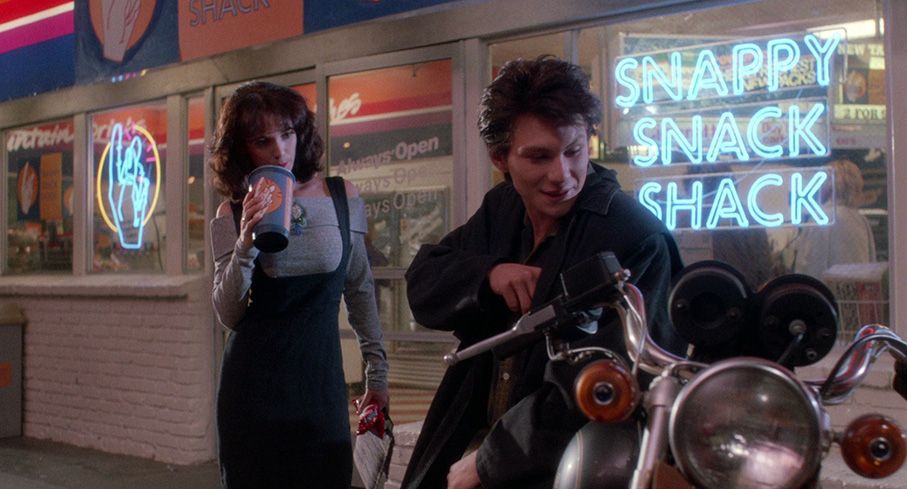| "Dear Diary, my teen-angst bullshit now has a body count." |
| Veronica Sawyer |
I'll freely admit that my experience in this field may be a little limited, but I've always associated the word ‘clique' primarily with American high schools. I'm fairly sure I didn't encounter the word until I started watching American high school teen movies in the 1980s, where cliques seemed to impose a sort of class system on this segment of a society that likes to claim it doesn't have a one. Over here, that all tends to be sorted before we even enter education, with the rich syphoned off into public schools, the middle class fighting over grammar school places and the rest of us shovelled into whatever is left over. At the comprehensive school at which I spent several unhappy years, there were certainly no cliques. What we had were gangs, and if you weren't in one of them then you kept your head down and took the occasional pasting, about which you kept quiet for fear of further beatings for being a snitch. If you'd tried to start a clique in my school you'd have got your arse soundly booted around the playground. And being female was no protection – the gang girls there were as tough as the boys.
The clique in Michael Lehmann's still-cherished debut feature takes its name from the title (actually, that should be the other way round), for the simple reason that its three founding members are all named Heather. All appear to come from well-to-do backgrounds and clearly believe they are the product of superior stock. They also thrive on their popularity, though quite why they are held in such high regard by students they haughtily look down their noses at is anybody's guess. Their newest wannabe member has the misfortune to be named Veronica, and it's clear from the off that while she craves their popularity, she intensely dislikes the three Heathers she feels pressured to suck up to. "I want to kill!" she writes angrily in her diary about clique leader Heather Chandler after dutifully attending a particularly grim party. But as Henry Fonda pointed out in 12 Angry Men, we've all said something like that at one point, but that doesn't mean we actually want to kill the person in question. Does it?

Lehmann sets up the essentials in the post-title scene, as Veronica is summoned to the cafeteria by Heather Chandler, who wants her to put her talent for handwriting forgery (bit of foreshadowing there) to use to play a cruel trick on overweight misfit student Martha Dunnstock, who they have spitefully nicknamed Martha Dumptruck. As Veronica reluctantly participates in Martha's humiliation, she's observed by a boy sitting alone in the corner, one whose dress sense and demeanour make him stand out from the throng. This is Jason Dean, or JD, a transfer student who moves to a new school every time the father with whom he lives relocates for his job. The curious Veronica ambles over and makes contact and the two are instantly attracted to each other. But it's after she departs that JD really shows his metal in a confrontation with school jocks Kurt and Ram that remains one of my favourite in all of 80s American cinema, albeit one whose lack of serious consequences for JD have been rendered a little startling by the dark face of changing times.
The two start seeing each other and after the above-mentioned party spend the night together. The following morning JD suggests, for a gag, that they concoct a hangover cure that will prompt the sleeping-it-off Heather Chandler to throw up. Veronica is all for it, but draws the line at the idea of lacing the drink with drain cleaner, which JD pours into an empty cup nonetheless. When Veronica takes her own noxious brew and hands it to Heather, she is unaware that she has picked up the cup laced with poisonous liquid instead. Heather chugs it down, and seconds later falls down dead through a glass coffee table (a terrifically filmed tumble, it has to be said). Veronica is mortified, but JD eventually persuades her to forge a suicide note, and in no time at all the school is mourning its loss. Against all expectations, the late Heather's popularity soars even further, and in no time at all the next in the Heather line has moved up the social ladder to take her place.
The American high school teen movie as a subgenre really flourished in the 1980s, a charge lead by John Hughes with the likes of The Breakfast Club and perennial favourite Ferris Bueller's Day Off. I have to admit that while I consumed all of these films, I was never a particularly enthusiastic fan. There's a cultural element to this, of course, with the American high school experience as it was portrayed in these movies having a fantasyland feel to someone of my educational experience, one built around characters and situations that quickly became stock components of the subgenre. When Heathers appeared at the end of the decade, it felt like the cinematic retort I'd been unknowingly waiting for, one that embraced these tropes and then wittily undermined them and ran the whole high school experience through with a strand of jet-black comedy that still jars today, in part because life sometimes does unwittingly imitate art.

One things that lifts Heathers head and padded shoulders above every other teen high school movie of the period is that it has at its foundation an absolute belter of a script by Daniel Waters, whose achievement is all the more remarkable for this being his first screenplay and written while he was working at a video store. Apparently based more on his sister's high school experiences than his own, he makes every line count and gives every character, no matter how brief their appearance, something memorable to say or do. He even gives the Heathers authentic sounding teen-speak that avoids feeling dated by being of primarily of his own invention, capturing the flavour of the ever-changing buzz-phrases of youth without tying the language to a specific time or place. This is especially true of the use of the word "very" as a stand-alone noun, as in, "How very," or "Come on, it'll be very," which absolutely sounds like something that would have been said by people who probably never actually used the word that way, at least before they heard it employed in this film. Other lines score primarily because they are delivered by upper-middle-class high school prima donnas and sound surprising coming from such delicate mouths, as when a miffed Heather Chandler says, "Well, fuck me gently with a chainsaw," or when Heather Duke asks Veronica, "Why are you pulling my dick?"
But while Davis makes a serious impression with his debut screenplay, Michael Lehmann matches him all the way with his first stint in the feature director's chair, in his impeccable casting choices, the performances he gets from just about everyone in the film, and in his eye for visuals that apparently take their cue not just from previous high school teen movies but the vivid descriptions in Davis's screenplay and Stanley Kubrick's approaching to framing and camera movement. The special features also suggest that he can take some credit for helping to compress Davis's close-to three-hour screenplay into a tighter 103 minutes of consistently entertaining screen time and ensuring that no single scene either outstays its welcome or feels unnecessarily hurried.

As Veronica and JD, the youthful stars-in-the-making Winona Ryder and Christian Slater were probably never better, in part because they had such great material to work with. Ryder really nails the blend of status-seeking enthusiasm and disgust at the hoops she is prepared to jump through to achieve it that initially defines Veronica, and convinces completely as she drifts into homicide and has to balance her horror at the crime she has inadvertently committed with the acknowledgement that she deep down she probably did want to see Heather dead. "I just killed my best friend!" she says after Heather Chandler's sudden demise. "And your worst enemy," chips in JD, to which Veronica responds, "Same difference." Slater, meanwhile, just oozes cool from the moment we first catch a glimpse of him in the cafeteria, something his disregard for convention, rebel outlaw dress sense and raised handlebar motorbike only serve to enhance. Just about everyone has commented on his similarity here to a young Jack Nicholson, with some going as far as to suggest that his performance borders on parodic impersonation, but I'm calling bullshit on that – Slater inhabits this role so completely that I genuinely can't imagine him played by anyone else (and yet he was, by several actors in the stage production of Heathers: The Musical and by James Scully in the belated and ill-conceived 2018 TV series spin off). Slater makes it easy to see why Veronica would be attracted to JD, but also keeps us and her on our toes for some time over the question of whether he is just a mischievous prankster with a twisted morality or a straight-up homicidal sociopath.* But they're not alone here, as even the smallest roles – including parents, teachers and two dope-smoking cops – have been cast with care, while as Heathers Chandler, Duke and McNamara, Kim Walker, Shannen Doherty and Lisanne Falk render their callous bitchiness as comical as it is smugly self-centred.
Of course, what also puts Heathers in a different league to its high school predecessors is its central premise and the blackly comic way in which it has fun with notions that other films since have tackled with more serious faces. The film did catch a little flak at the time for making light of the concept of teenage suicide, which back in 1980s America was deemed by many to be a serious problem. But I'd argue that the film never actually mocks the issue and that some serious points about it grow organically from the comedy. The hypocritical nature of the response to Heather Chandler's death is a case in point, as a girl who, though popular, was consistently unpleasant to others becomes treasured as a saint after she has supposedly taken her life for reasons concocted by JD and Veronica. As others are similarly canonised after supposedly taking their own lives, the media runs with the story and a terrible pop song with the lyrics "Teenage suicide – don't do it!" becomes a smash hit, the knock-on effect of which is to prompt a tormented student to genuinely try to kill herself in the hope that she will find similar popularity after her death.

Which brings me back to the early confrontation between JD and school jocks Kurt and Ram. Back in 1988, who knew that a prank involving a gun loaded with blanks fired at two students would a few years later have such ominous overtones? Here, it lands JD a mere two-week suspension, but nowadays would result in immediate panic and an armed response that would probably end in JD's violent death at the hands of heavily armed security personnel. When I first saw this scene I laughed out loud and I still laugh at its build-up, but I'd imagine that anyone who has first-hand experience of one of the mass school shootings that have blighted America in recent years will have a somewhat different response.
If the fashions and hairstyles – and to a degree David Newman's sometimes almost Carpenter-esque electronic score – root the film in the 1980s, that's not a big deal, as that was when the film was made and set and we're surely used to contextualising movies to their time and location by now. This can't be counted as fault in a film that gets pretty much everything right and has aged better than I could ever have expected. Where other teen high school movies of the period always felt to me like films made by adults with a teenage demographic in mind – which essentially they were – Heathers plays more like a movie made by the people that the film is about, one drawn from a combination of experience and dark fantasy about how high school was or maybe should have been for them. It gets to have its cake and eat it by satirising elements that it also takes seriously, from the canonising of suicide victims to the pressures to be popular in a world in which that is the only real currency of worth, and repeatedly undercuts its darker gags with subtle reminders of the real-world impact of the actions being depicted. Crucially, it does this all with the sort of style, wit and professionalism in every department that was far rarer in 80s American movies than the current nostalgia for the decade tends to suggest. So many still cite Ferris Bueller as the primo American teen movie of the 1980s, but for me Heathers has always been the one, and nothing I've seen since has altered that opinion.
I always remember Heathers as a visually lively film and that's handsomely showcased in Arrow's first-rate 4K restoration, from which the splendid 1080p 1.85:1 transfer on this Blu-ray was sourced. Colour – which is used to specific purpose here (the three Heathers are subtly colour-coordinated) – is vibrantly reproduced but never over-saturated, the contrast is carefully balanced to solidify the blacks but still keep detail clear in darker scenes, and the image detail is sharp and cleanly reproduced throughout. A fine film grain is visible, and all damage and dust has been carefully cleaned away. As one of the many who first caught Heathers on VHS tape, this is far and away the best I've ever seen it look.

There are three soundtrack options, Linear PCM 1.0 mono, Linear PCM 2.0 stereo and DTS-HD Master Audio 5.1 surround. There's not as much to choose between them as you might expect, in part because the original mono track was so cleanly recorded and mixed, though the music broadens a little in stereo and becomes a little fuller in 5.1, and there's detectable separation in the location sound on the stereo and surround tracks. For clarity and depth, the 5.1 just wins it.
Optional English subtitles for the deaf and hearing impaired have been included, as expected on an Arrow disc.
Audio Commentary
Sourced from the earlier Anchor Bay DVD release, this commentary features director Michael Lehmann, producer Denise Di Novi and writer Daniel Waters unusually carries a front-end warning about strong language, and in a film in which the word ‘fuck' is used a number of times usually means only one thing. This is confirmed when Waters complains about the substitution of one curse word for another and states in an amusingly matter-of-fact manner that "we really needed a cunt here." It's actually Waters rather than the softer-spoken Lehmann who takes the lead here, and the lively honesty with which a whole range of topics are covered makes this a consistently entertaining and informative listen. Areas addressed include: things that were changed from the darker and considerably longer first-draft script; the influence of Kubrick and particularly Full Metal Jacket on the film's visual style; the casting of the leads and significant supporting characters; the incorporation and subversion of tropes from previous teen high school movies; the original ending; and plenty more. Great stuff.
Lehmann's Terms (15:05)
A new interview with director Michael Lehmann that benefits from having almost no crossover with the commentary or the other special features in which Lehmann participates, and the fact that Lehmann is such an engaging interviewee. Here he recalls his decision not to go straight to film school, his time working for Francis Coppola's Zoetrope studio, meeting lifelong friends Scott Alexander and Larry Karaszewski at USC, how his graduation film The Beaver Gets a Boner (which is on this disc) helped to open industry doors, the process of getting to direct Heathers, and more. He ends with some basic but still solid advice to budding filmmakers in the age of digital cameras and HD smartphones – "If you want to be a director, make movies."

Pizzicato Croquet (11:11)
Composer David Newman, with some input from Michael Lehmann, talks about the score for Heathers, including the budget-driven decision to use synthesisers and some specifics of composing for individual sequences. He intriguingly describes his music for the film as a texture score and reveals that he enjoys composing by "playing with sound and seeing what happens."
How Very: The Art and Design of Heathers (15:14)
Production designer Jon Hutman and art director Kara Lindstrom talk about their work on the film, again with contributions from Michael Lehmann, who is quick to point out how important creative production design was to Heathers. Both Hutman and Lindstrom are likeable interviewees, and point out that most of their work is done before the film starts shooting and that everything in frame that is not an actor is down to the art department.
Casting Westerberg High (11:37)
Casting director Julie Selzer discusses – no surprise here – the casting process for Heathers, recalling how much she liked the script, how all the girls had a crush on the young Michael Lehmann, and even outlining what makes a good casting director. She also still regards this as the favourite of the films she has been involved in.
Poor Little Heather (17:41)
A newly shot interview with actor Lisanne Falk, who plays Heather McNamara, probably the most sympathetic of the Heathers. She recalls her (very) early days as a model and becoming modelling buddies with an equally young Brooke Shields, moving into acting and getting cast and then re-cast in Heathers, and as lying about her age to be sure of getting the part and then getting rumbled at a ‘getting to know each other party'. She reveals that she quit acting and producing early on to focus on motherhood, and that she liked the script for Heathers so much that she would have played any role to be in it, despite advice to the contrary from her agent, a familiar story when it comes to this movie.

Scott and Larry and Dan and Heathers (38:27)
A newly shot piece in which the screenwriting team of Scott Alexander and Larry Karaszewski – who became good friends with Michael Lehmann at USC and whose credits include Ed Wood and The People vs. Larry Flynt – hang out and chat with Heathers screenwriter Daniel Waters. This is another entertaining and revealing discussion, as they get into detail about Waters' early days in Los Angeles – including his self-constructed beds and his job at a mini-mart video store – during which period he wrote Heathers. Not for the first time we hear that he wanted it to be Stanley Kubrick's teen movie, and there's an engaging story about how the three then-young men prepped for their first studio meetings by essentially play-acting them, with Waters cast as a deliberately distracted executive. Interesting to learn that once the script started getting passed around, people were keen to meet Waters but not make the movie, and that on seeing an apparently disastrous second cut of the film, a dismayed Waters claimed it would be "a bigger dog than Digby." Handily, he provides an explanation of that comment for those of you who are too young to get the reference.
The Big Bowie Theory (35:03)
A newly filmed appreciation of the film by writer, actor and comedian John Ross Bowie, who does a sterling job of outlining just what it is that makes the film so special. Aspects covered in thoughtful detail include the films that influenced Heathers and the influence it had on later movies, its visual debt to Kubrick, the performances, the music, the issues of teen suicide and rising gun violence in schools, the film's success with New York audiences, and more. He says of the script that it "packs so much incredible punch that all the actors have to do is stay out of its way," and reveals that as a long-time fan of the film, when he discovered that his first ever TV pilot was to be directed by Lehmann, "I lost my shit."
Return to Westerburg High (21:21)
An archival featurette produced by Anchor Bay for its 2008 DVD release, built around interviews with screenwriter Daniel Waters, producer Denise Di Nova and director Michael Lehmann, who also did the commentary. Inevitably, there is some crossover with other special features on this disc, but still a fair amount that is unique to this extra, including the news that the premature deaths of two cast members were grimly foreshadowed by the dialogue in the movie. At one point, Michael Lehmann suggests that it's harder to do satire these days because reality is more twisted than anything you come up with, and that was nine years before Donald Trump took office...

The Beaver Gets a Boner (19:53)
The topic of a number of discussions in the special features, Michael Lehmann's 1985 student film made at the USC School of Cinematic Arts provides some clarification for why he was considered a good choice to direct Heathers. The film revolves around bad boy Angus Leech, who dresses like a rocker, rides a cool motorbike, wears provocative t-shirts and deals hard drugs to local schoolkids. His girlfriend Dooreen (yes, that's how it's spelt) dresses and behaves like Sandy from Grease after her late-film transformation had she decided to up the slut factor a few notches, and when we first meet her is about to start a stretch in Juvenile Hall. Angus deals for local mob boss Leroy (played by dwarf actor Tony Cox, whose other credits include Beetlejuice, Willow and Bad Santa) but keeps coming up short, and Leroy has a habit of cutting off the testicles of those who don't pay their debts and displaying them on a mantelpiece at his club. When his disapproving mother flushes the drugs he was due to sell down the drain, a desperate Angus discovers that he can secure the money he needs by winning a scholarship, but in order to do so he has to transform himself into the hardest-working and most dedicated student on campus.
That you're watching a 16mm-shot student film is never really in doubt, especially for anyone who's spent a couple of years at film school themselves – the photography is grubby and uncreatively lit, the pace is inconsistent, and it's clear that Lehmann used anyone he had to hand (including fellow USC student Scott Alexander) to fill out the supporting roles rather than auditioning actors. But there's also an air of mischievous anarchy to the project, which at time plays like a cheerful middle finger salute to the sort of films we all tended to be pushed into making at film school, ones that could be screened to the public and funding bodies without causing offence to even the most uptight prude. In his interview on this disc, Lehmann adds weight to this theory by describing the film as "brash, obnoxious and deliberately offensive" and also suggests it wasn't very good. It's not great, sure, but its cheerfully provocative sense of anarchic fun does prove infectious, and it's blackly comic elements and rebellious lead character do signpost where Lehmann's career was soon to head. It's also nice to be able to finally see the film we've been hearing about for so many years.
Lethal Attraction (Heathers) Trailer (2:55)
A solidly assembled but spoiler-littered trailer for the film under its terrible substitute title, Lethal Attraction.
30th Anniversary Rerelease Trailer (1:45)
Slicker than the above and with fewer spoilers, but some alternately odd and obvious music choices.

Image Gallery
A substantial gallery consisting of 174 slides of press materials, including posed cast photos, behind-the-scenes imagery and a couple of posters.
Booklet
Another attractively produced Arrow booklet kicks off with the main credits for the film, then launches into a thoughtful and detailed essay on the film by broadcaster, filmmaker and journalist Bidisha. This is followed by a similarly scholarly look at the ways in which Heathers remains relevant today by film and events programmer Anna Bogutskaya, and a useful reprint of a 1988 interview with director of photography Francis Kenny from the November 1988 issue of American Cinematographer by David J. Heuring. Finally, we have information on the restoration, which goes into a lot more detail than I have above.
A favourite film from the late 1980s has aged better than I could ever have expected; if anything, the passing of time has helped to confirm its many qualities, from Daniel Waters' superb screenplay to Lehmann's confident direction and a whole string of perfectly pitched performances. For fans of the film, Arrow's Blu-ray is a dream come true, boasting a terrific transfer from a fine restoration and a slew of excellent special features. We're a bit late with this one because we only had a DVD review disc and I wanted to get my hands on the Blu-ray before proceeding, so I'm guessing a good many of you have already snagged this, but if not then be sure it comes most highly recommended.
|